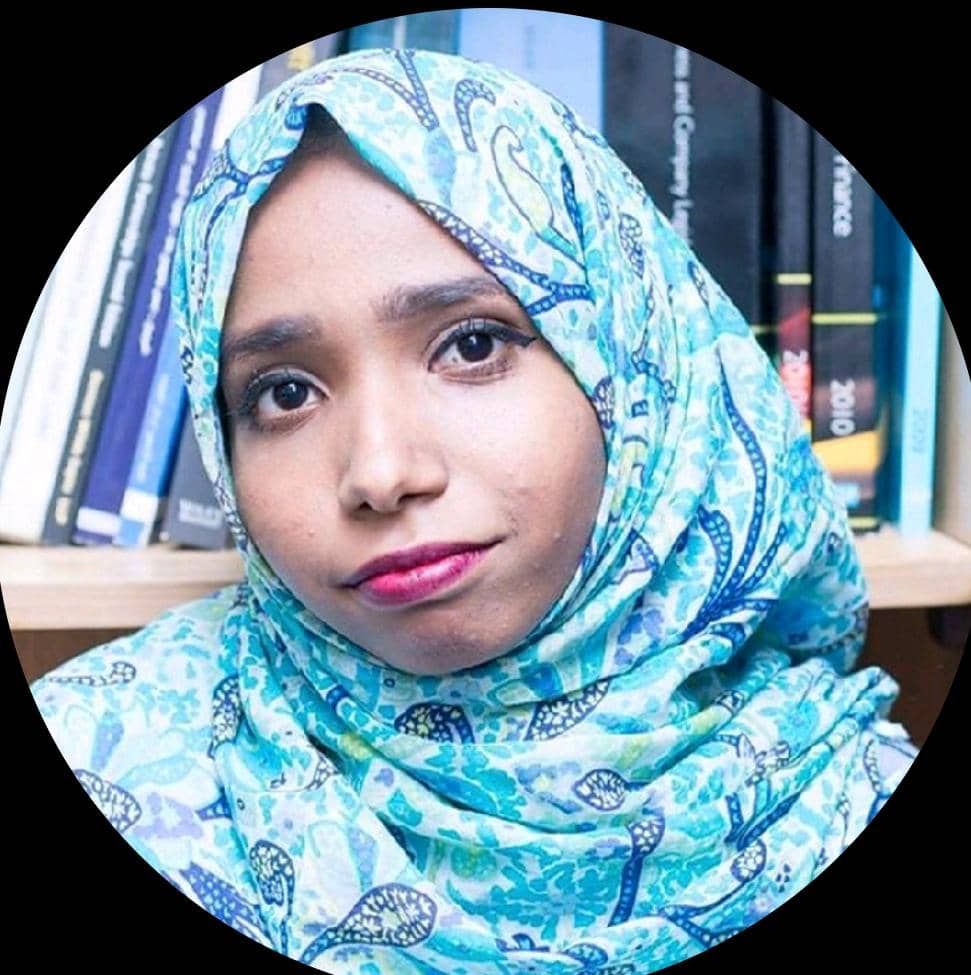The success of public health government programs depends on effective partnerships between religious institutions, policymakers, and medical professionals. Directives from the World Health Organization (WHO) against social gatherings to control COVID-19 transmission both negatively and positively impacted religious-political partnerships. Compliance of communities to national lockdowns requires support from community faith leaders. Across the African continent, faith plays an important role within communities that display diverse religious practices.
During the Ebola epidemic in Africa, faith groups played a crucial role in spreading information from the WHO to control community disease transmissions. Holding onto religion seems to be the light that saves many souls, which looks like a great idea until religious sentiments are distorted to make people afraid of protecting themselves outside of God's will. This poses a big question since God commands us to protect ourselves and our loved ones. Then why would religion be against the vaccine?
Many people rely on their faith for guidance and strength during times of hardship, like the COVID-19 pandemic, and Sudanese are no different. Some community feedback highlighted prayers and religious rituals as a cure or treatment for a COVID-19 infection. There were also myths that the pandemic is a punishment for our sins, and COVID-19 restrictions on congregational prayers are against Islam.
The Anti-vaccination Movement and Religious Sentiments Behind It
Vaccine hesitancy still represents a phenomenon that undermines the effectiveness of vaccination campaigns, and population protection from vaccine-preventable diseases.
Across the world, religious reasons underpinning vaccine hesitancy have been identified for many religious groups, including Protestants, Catholics, Jewish, Muslims, Amish, Hinduist, and Sikhist. For instance, the porcine or non-halal ingredients of vaccines was the main barrier identified by Muslim populations. Another reason for refusal among Muslims was related to Ramadan and the fasting period and whether vaccines break one's fast the way food and water do.
Objection against vaccination for Protestants, Catholics, and Jewish is also related to these religions advocating for people to have faith in divine protection and healing. Amish and Catholic communities protest the alleged use of electively aborted fetal cells for vaccines production. The communities raised a storm during the COVID-19 outbreak, where senior Catholic leaders from the US and Canada raised ethical objections to vaccines produced using cells derived from electively aborted fetuses.
Historically, there was hesitancy against the use of HPV vaccination, with the belief that it led to sexual promiscuity among Christian children. Thus parents considered this vaccine useless for their child, assuming its consequences lead to a certain sexual lifestyle. Religious taboos were among the main reasons for non-vaccination among Hinduism and Sikhism believers too.
How Religious Leaders Came Together to Assure the Masses.
Since the pandemic hit, many believers looked up to their religious leaders waiting for their instructions on how to go about with vaccination. The pilgrimage to Mecca was cancelled and some Muslims felt that they are losing their connection with their faith.
Religious leaders categorically emphasized that in the trying times of the COVID-19 pandemic, it was not wise to make the situation worse by congregating even for religious reasons, as well as highlighting the importance of the vaccination. Islamic religious leaders addressed the fact that a vaccine is permissible even in Ramadan and will not invalidate the fast.
The Coptic Church in Omdurman in particular, came up with various content, especially videos with the blessings of higher priests to educate the public on the dangers of COVID-19. During an Andariya interview with Archpriest Timothy, he highlighted the role the Coptic church had in organizing vaccination campaigns. He also explained that they took the initiative to sensitize the congregation on how to take precautions. With the many numbers, the believers also had to alternate attending church services.
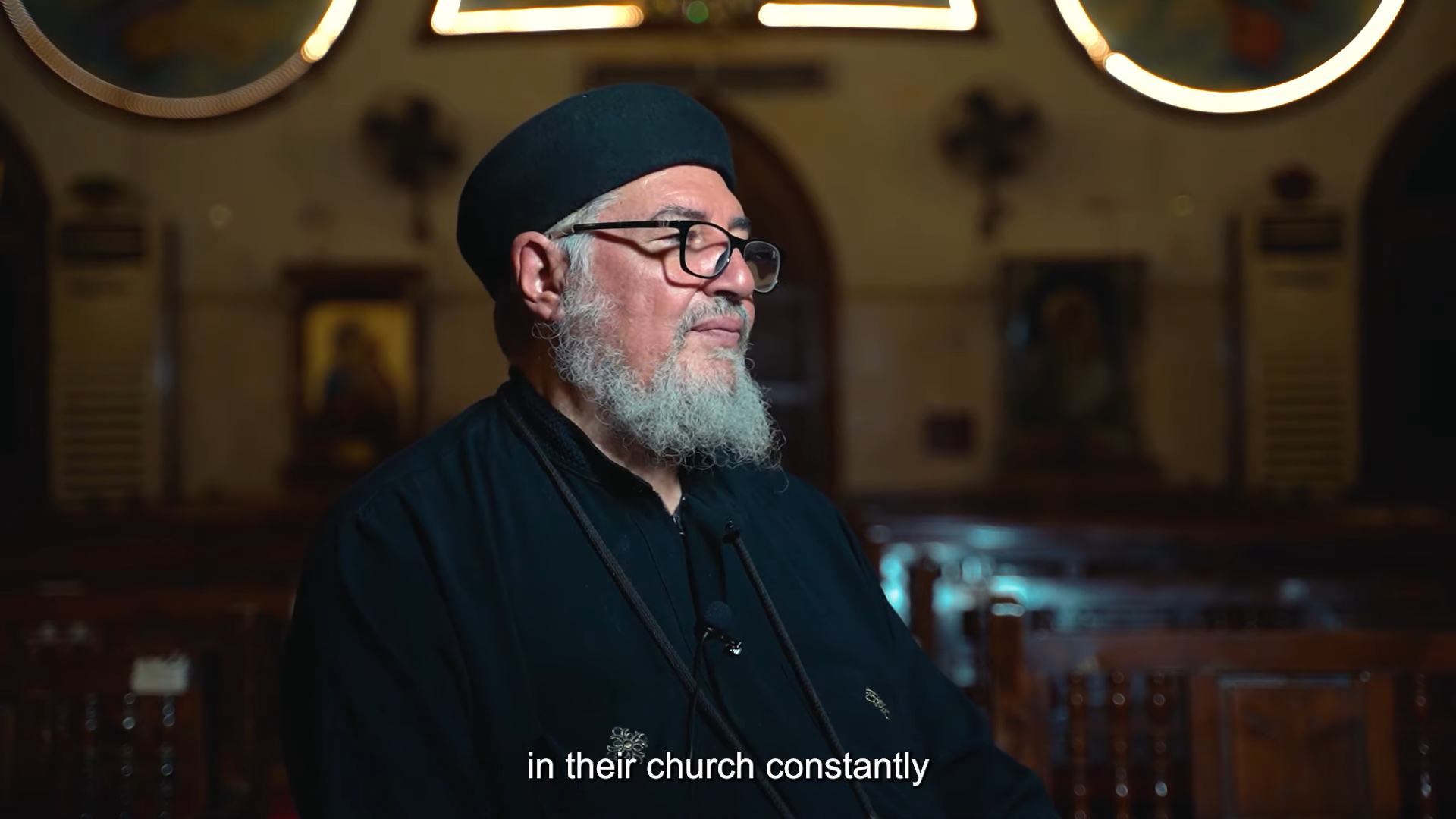
Archpriest Timothy during an interview with Andariya. Source: Andariya Magazine
Under its Healthy Ramadan campaign, the World health organization came up with messages backed by prominent fatwa bodies like Al-Azhar and International Islamic Fiqh Academy encouraging Muslims to take the COVID-19 vaccines during the fasting period. They explained that COVID-19 vaccines are permissible under Sharia law and that taking the vaccines does not invalidate the fast.
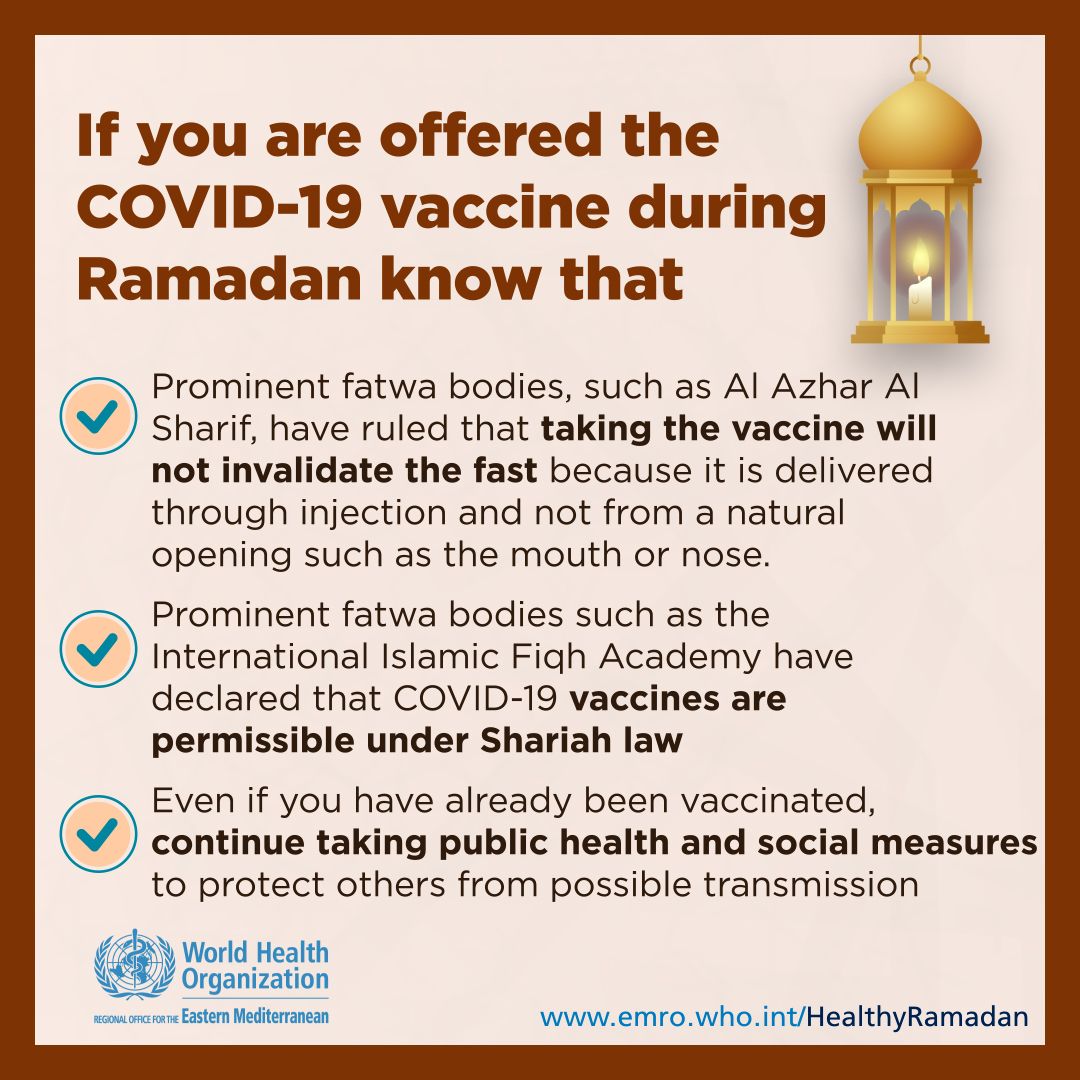
A World Health Organization message on the COVID-19 vaccine during Ramadan. Source: Twitter/ @WHOEMRO
How Will Religious Rituals Manifest Moving Forward?
Among the plethora of social distancing pictures - which swept the Internet at the peak of the pandemic- was a viral snap of a baby being baptized using a plastic water gun. The photo showed a Tennessee priest, Father Stephen Klasek, dressed in his robes and wearing a face mask as he baptized a child while maintaining a two meters distance.
The water in the plastic gun was not holy water, and it was squirted towards the dad and not the baby for humor, and to emphasize social distancing and wearing masks as a healthy approach to prioritizing people's health. The family had requested the priest to do this pose as they copied it from several posts of priests circulating around the internet.
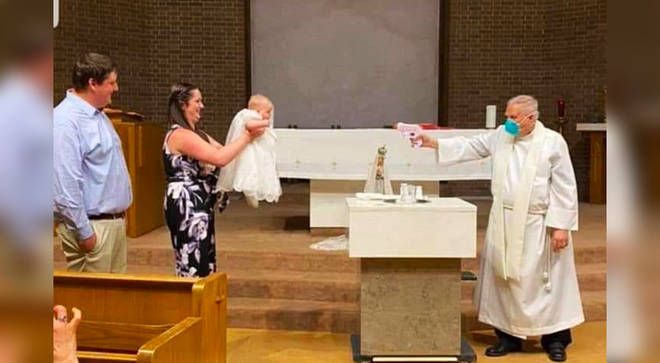
A staged photo of a priest baptizing a baby using a toy gun. Source: Classic FM
It was not the first time that a clergyman found a creative, yet safe, way of continuing worship amid the Coronavirus pandemic. In April Reverend Timothy Pelc, a priest in Detroit, blessed churchgoers with a water gun as worshippers remained in their cars from a distance.
In Sudan, religious leaders had a big impact on their local communities, as they helped facilitate vaccination campaigns. Some hosted the vaccination centers at their mosques and churches and even preached constantly on the importance of the vaccine. They highlighted the dangers of Coronavirus and the importance of timely full vaccination and taking precautions if the places of worship were to be reopened.
Shiekh AlMarghani's landmark in Kassala was an example of religious support of Coronavirus mitigation. The landmark's Imam insisted that visitors observe social distancing and wear masks during visits. Additionally, due to the high number of visitors, the shrine regulated the numbers to guard against overcrowding.
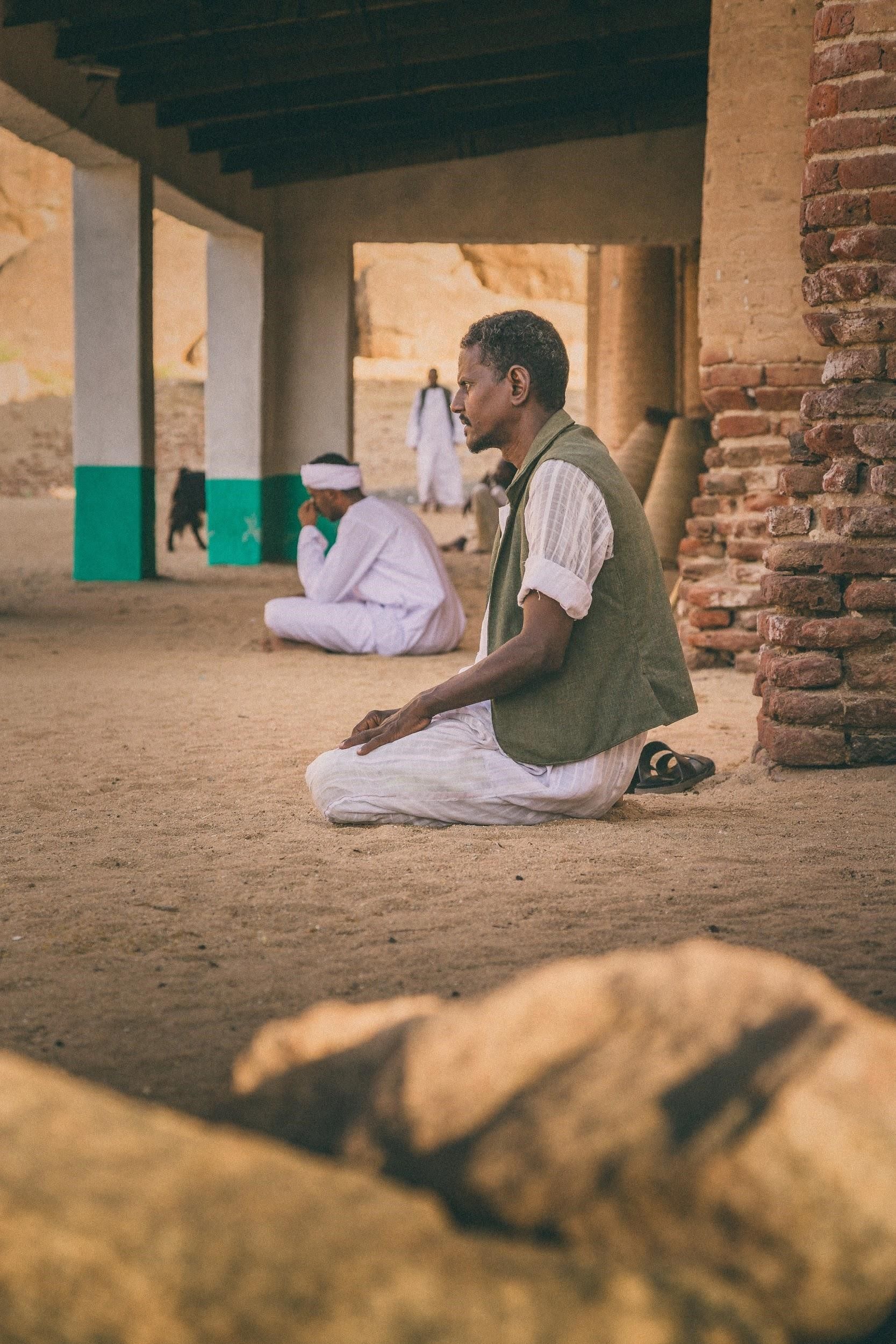
Men social distancing as they pray at Sheikh ElHassan ElMarghani's shrine in Kassala. Source: Andariya Magazine
The Institute of Islamic Legislation also played a very big role during the pandemic in Sudan. It issued fatwas about the necessity of taking the vaccine if one is going on pilgrimage and explained how the vaccine is in line with God's ordering us to protect ourselves and others. The institute sensitized the masses on how self preservation is one of the bricks of the Islamic faith.
Conclusion
A staggering amount of misinformation is still circulating in in Sudan about the safety and efficacy of COVID-19 vaccines. Taken together, conspiracy theories and vaccine misinformation are undermining the public health response, including vaccine uptake.
Governments and other stakeholders need to intensify efforts to engage religious leaders, educate them and help them use what they learn to help their congregants understand the value of vaccination and other COVID-prevention methods.
Religion is an important part of the social and cultural fabric of many communities. As such, religious leaders have the power to inhibit or facilitate the adoption of COVID-19 vaccines. Given their high level of influence, interventions that engage clerics as change agents for shaping opinions and influencing behaviors related to COVID are crucial for increasing vaccine uptake.
Vaccinating a substantial portion of society has been found to be the best way to bring the COVID-19 pandemic under control. The public needs to appreciate God’s gift of life by ensuring that they vaccinate to protect themselves against Coronavirus.
